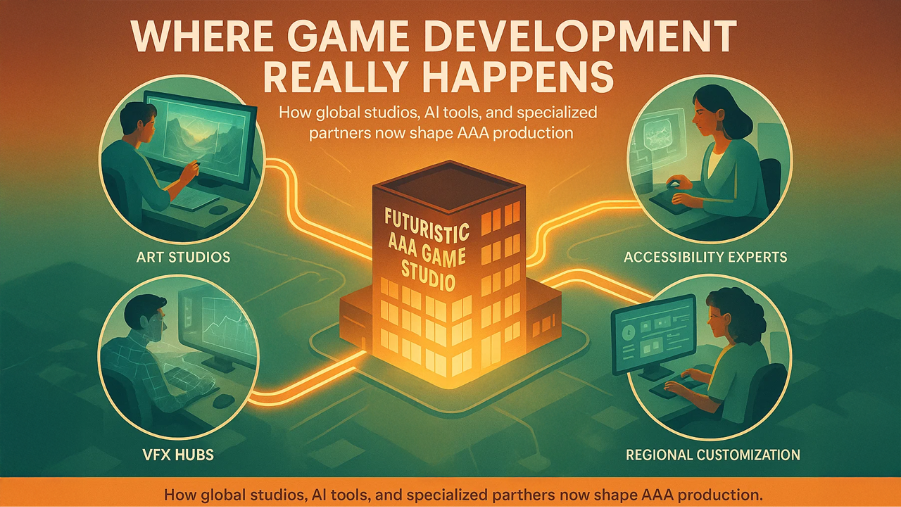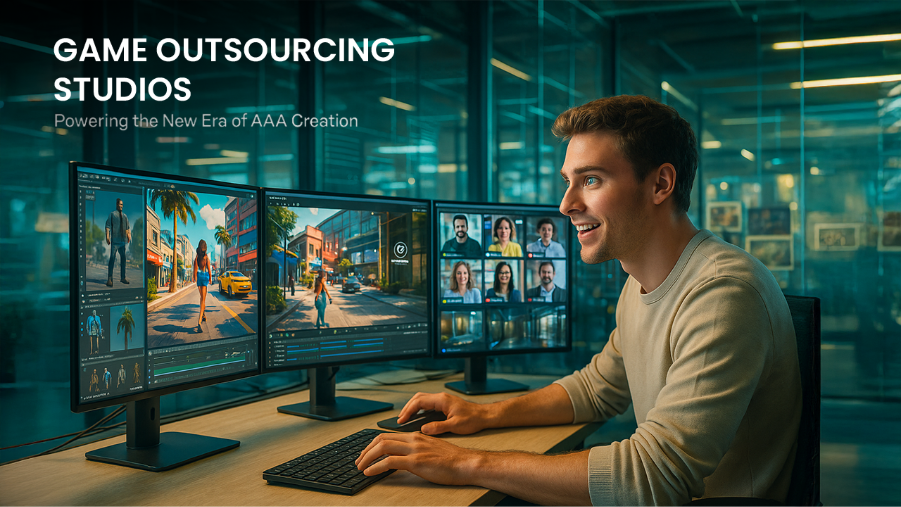The credits for Starfield scroll for eleven minutes. Most of that time, you're watching names of people who don't work for Bethesda — artists from Malaysia, animators in Ukraine, QA testers in Poland. This isn't unusual anymore. If anything, Bethesda is unusually transparent about it.
Every major game released in the past two years has leaned heavily on external studios. Not because publishers are cutting corners, but because making a modern AAA game without outsourcing is like trying to build a skyscraper with only your immediate family. Technically possible, but why would you?
Something fundamental shifted in how games get made, and most players haven't noticed. The industry certainly hasn't rushed to advertise it. But game development outsourcing has gone from a dirty secret to the actual backbone of AAA production, and understanding why tells you a lot about where gaming is headed.
What’s Driving the Shift in AAA Development
Outsourcing isn't new. Studios have contracted external help since the industry began. What's different now is the scale and integration. External development teams aren't just handling overflow work anymore — they're embedded in core production from day one.
The pandemic accelerated this, obviously. When everyone went remote in 2020, the theoretical advantages of keeping teams in one building evaporated overnight. Suddenly that studio in Kyiv or Montreal or Singapore wasn't at a disadvantage compared to your satellite office across town. Distance stopped mattering as much when nobody was in an office anyway.
But the real driver is scope. Games got too big. Red Dead Redemption 2 took eight years and every Rockstar studio globally. The Last of Us Part II needed support from studios across three continents. These aren't outliers — they're the new baseline for what AAA means.
You can't afford to keep specialists on staff for every possible need. That photogrammetry expert you need for three months of environment capture? The technical artist who specializes in cloth simulation? The team that understands how to optimize for the Steam Deck's specific hardware quirks? You hire them when you need them, not permanently.
Why Modern Outsourcing Actually Works Better
The economics make sense, sure. Labor costs less in Wroclaw than in San Francisco. But that's not the interesting part.
Modern outsourced game production works because the tools caught up. Five years ago, coordinating assets across multiple studios meant endless versioning headaches, incompatible pipelines, lost work. Now? Cloud-based engines, real-time collaboration features, standardized asset formats. An artist in Vietnam can literally work in the same Unreal Engine scene as someone in Texas, simultaneously.
Version control systems that were built for software development got adapted for game assets. Project management tools matured. Communication got frictionless enough that time zones became more of an advantage than a problem — you can keep production running 24 hours by staggering teams across continents.
Specialization matters more than people realize. Studios like Virtuos built their entire business around specific technical challenges — porting, optimization, and platform-specific development. Keywords Studios handles localization at a scale that would be impossible for any single publisher. Game outsourcing studios such as Kevuru Games or Room 8 have carved out niches in high-end art production that fits seamlessly into AAA pipelines.
No single studio can be best-in-class at everything anymore. The technical demands are too diverse. So you build your core team around creative vision and direction, then bring in specialists who've spent years perfecting specific crafts.
There's also a creative argument that doesn't get made enough. Teams from different countries bring different visual vocabularies, different approaches to problem-solving. A game built entirely by people from the same cultural background, educated in the same schools, playing the same games growing up — it's going to have blind spots. Diversity isn't just ethics, it's practically useful when you're trying to build worlds that need to feel real to players everywhere.
Where the Future of Outsourced Development Is Heading

Game development outsourcing isn’t just the new normal — it’s accelerating.
Development costs keep climbing. Player expectations keep rising. The audience is global, so games need to work across cultures, languages, regulations. You can't build that capability in-house without becoming unsustainably large.
The studio model that dominated for thirty years — big permanent teams, everything internal — it's already obsolete for AAA development. Publishers are shifting toward smaller core teams focused on creative direction and IP ownership, surrounded by a flexible network of specialized external partners. It's closer to how film production works, actually. Marvel doesn't keep all their VFX artists on permanent staff. They don't own the studios doing their CGI. They manage a network.
AI will change this, but probably not how people expect. Generative tools won't eliminate the need for artists — they'll change what artists spend time on. Instead of manually placing every tree in a forest, you direct an AI to create the forest with specific characteristics, then refine the interesting parts. That doesn't reduce the need for external development teams. It changes what they do.
New specializations keep emerging. Studios focused entirely on accessibility. Teams that only do live-service content updates. Partners specializing in regional customization beyond translation — actually adapting gameplay for different markets. Some are even bringing expertise from adjacent fields like gamification in CRM to create more engaging player progression systems and retention mechanics. Outsourced game production is fragmented into increasingly specific niches. Outsourced game production is fragmented into increasingly specific niches.
What’s striking is how invisible this remains to players. The best AAA games don't feel outsourced because everyone got good at this. You play Baldur's Gate 3 or Cyberpunk 2077 or Spider-Man 2 and have no idea how many studios contributed. That's the point.
The Industry’s Turning Point
What's actually happening is the industry is growing up. Publishers used to be embarrassed about outsourcing. Now they brag about their partner networks. Sumo Digital, Kevuru Games, Virtuos — they represent strategic advantages. The question isn't whether to work with external studios, it's which ones and how to integrate them most effectively.
This might bother people who romanticize game development. The small team in a garage, the singular creative voice, all that. But most of those stories were myths anyway. Even in the '90s, even at small studios, great games came from collaboration and compromise and teams with different skills pushing each other.
The scale changed. The principles didn't.
Games are getting better, on average. More polished, more ambitious, more accessible. Part of that is technology improving. Part of it is talent spreading globally, with opportunities reaching people who would've been locked out of the industry thirty years ago. Game development outsourcing isn't just cheaper — it's more democratic. You don't have to move to California or Tokyo to work on a major title anymore.
The future looks like more of this. More distributed production, more specialized partners, more sophisticated coordination of global teams. Less monolithic studios, more networks. The revolution already happened. We're just living with the consequences now, which mostly involve better games taking slightly less time to make.








